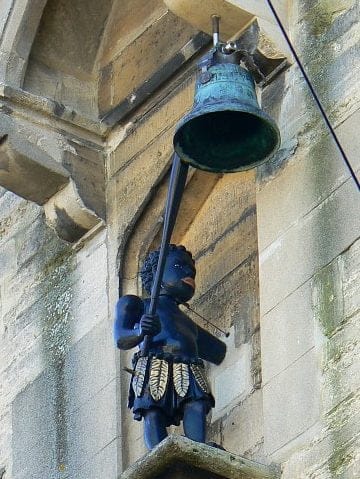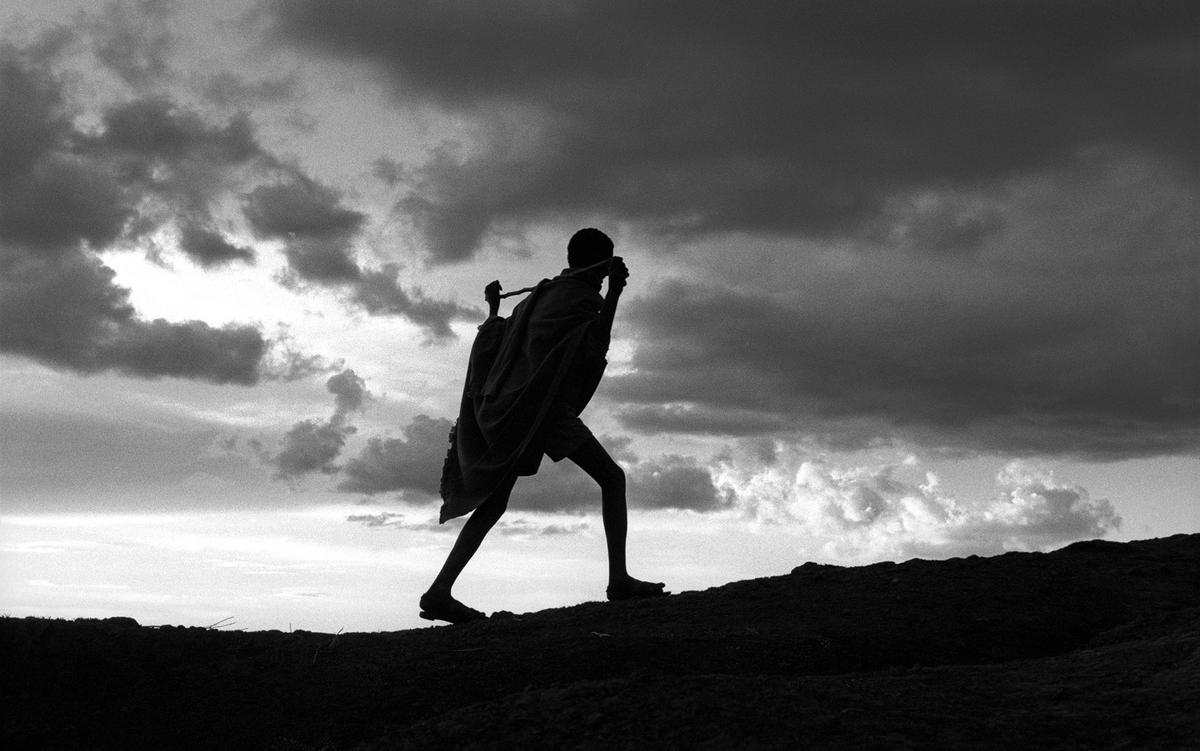Nice Clock: Caricatures and Colonialism

By Sean Buckley
As some readers will be acutely aware, the past few weeks have been marked by recurring debate on the presence of the ‘Black Boy Clock’ on a historical building in Stroud. Antiracist campaigners have advocated for its removal, with some saying it should be placed in Stroud’s Museum in the Park for posterity. In a possibly involuntary reaction against any sort of progress, local MP Siobhan Baillie has leapt to the aid of the ludicrous caricature, lest it be unduly victimised by the unhinged radical left.
Over the past few years, we’ve seen the Americans have several riots over the removal of Confederate statues, while Bristol had a moment in the international limelight last June when residents chucked Colston in a canal. Even the EDL got involved when they were so worried about Antifa taking down a statue of Churchill they decided to fight the police.

While some local elements might be all riled up and ready to defend a statue to the last, it’s worth taking a step back to consider what the clock actually is. Unlike the statues in Bristol, the U.S or London, the ‘Black Boy Clock’ does not remember any important people or historical events. It doesn’t signify any greater meaning or context beyond being a horrible, vicious cartoon. Whatever you may think about the lengthy list of horrors committed by the likes of Colston, Cecil Rhodes or even General Lee, they were men that existed and had a significant impact on history and the world we live in. That doesn’t necessarily justify them remaining to loom ominously over our public spaces indefinitely, but using the weight of history as a defence probably requires the figures to have made some impression.
Instead of any historical figure, the clock depicts a dark-skinned child, with bright red lips, complete with leaf skirt and club. Considering what the clock actually is, it is astounding that anyone could reasonably seek to justify its display in public. Have we not come to a general understanding in society that racial caricature just really isn’t on anymore? Even Disney, everyone’s favourite maniacally evil monopoly, has had the good sense to remove all its explicitly anti-Semitic and racist cartoons from public view. Though they are still available to those who want them, some have been amended to include a preface warning about the depictions within. Almost as if they were in a museum.
The defence of the clock seems bizarre, with criticisms of the ‘outrage’ of antiracist activists as the often invoked spectre of the apparently intolerant left. Attempting to justify such an outrageous cartoon makes you wonder whether local right wing activists have finally jumped the racist shark.
‘First they came for the golliwogs, and I said nothing.’
The clock doesn’t stand to represent any moment in our ‘journey’ towards ‘progress’ as our MP might believe. Rather, it blatantly serves to reinforce the racist and bewilderingly widespread belief that pre-colonial Africa was entirely primitive and devoid of any civilisation: a myth that seems to be almost as prevalent today as it was when the clock was erected in 1774.
Specifically omitted from this myth is the fact that pre-colonial Africa was crossed with peoples having advanced civilisations for hundreds of years, while much of Europe was busy scrabbling about in the dark ages. Kingdoms in modern day Mali, Egypt, Sudan and Ethiopia – to name but a few – were having golden ages of written language, art, culture and philosophy considerably before the arrival of colonial powers. From modern day Mali, Mansa Musa, often credited as the richest man to ever live, gave away so much gold in Cairo during his Hajj in the 13th century that it caused a devaluation of currency and an economic crisis that lasted over a decade. Elsewhere in 17th century Ethiopia, philosopher Zera Yacob wrote on universal equality and criticised organised religion decades before his European counterparts took credit for the enlightenment. A huge part of the legacy of some of these cultures was actively destroyed by colonists in order to conserve the myth of an uncivilised Africa.

Preserving this image of pre-colonial Africa is an important step in justifying the colonial mission, or the white man’s burden, to bring civilisation to the savages whilst applauding ourselves on our ‘progress’. In the past, this was also used globally to justify slavery and legally enforced racial hierarchies, as Black Africans were supposedly unable to handle the responsibility of governing themselves. In the modern day, this myth is used to reason to justify the legacy of colonialism, arguing that despite the slave trade, the incalculable cost of pillaging and an unending heritage of political fracture, the entire ordeal was somehow a net benefit for the continent.
The point here is that the ‘Black Boy Clock’ doesn’t serve as a reminder for much of anything from actual history. The myth it perpetuates has influence today, impacts the way we think and what we believe about an important part of global history. Jumping to preserve this artefact displays an arrogant disregard for both genuine history and the real people alive today that feel belittled and devalued by a vile, disrespectful caricature.
The exasperation many people, especially people of colour, feel with the whole debate is largely ignored. Simple calls for removal are dismissed as outrage culture, as if people spend their days searching for new and interesting ways to be offended, rather than just expecting to go about their lives without caricature or insult. It is tiring to see certain elements leap to the defence of an object so petty as a clock. As Baillie notes, the removal of the clock will not “end the scourge of racism” overnight. Despite protests to the contrary, history will not be erased with it either.



Member discussion